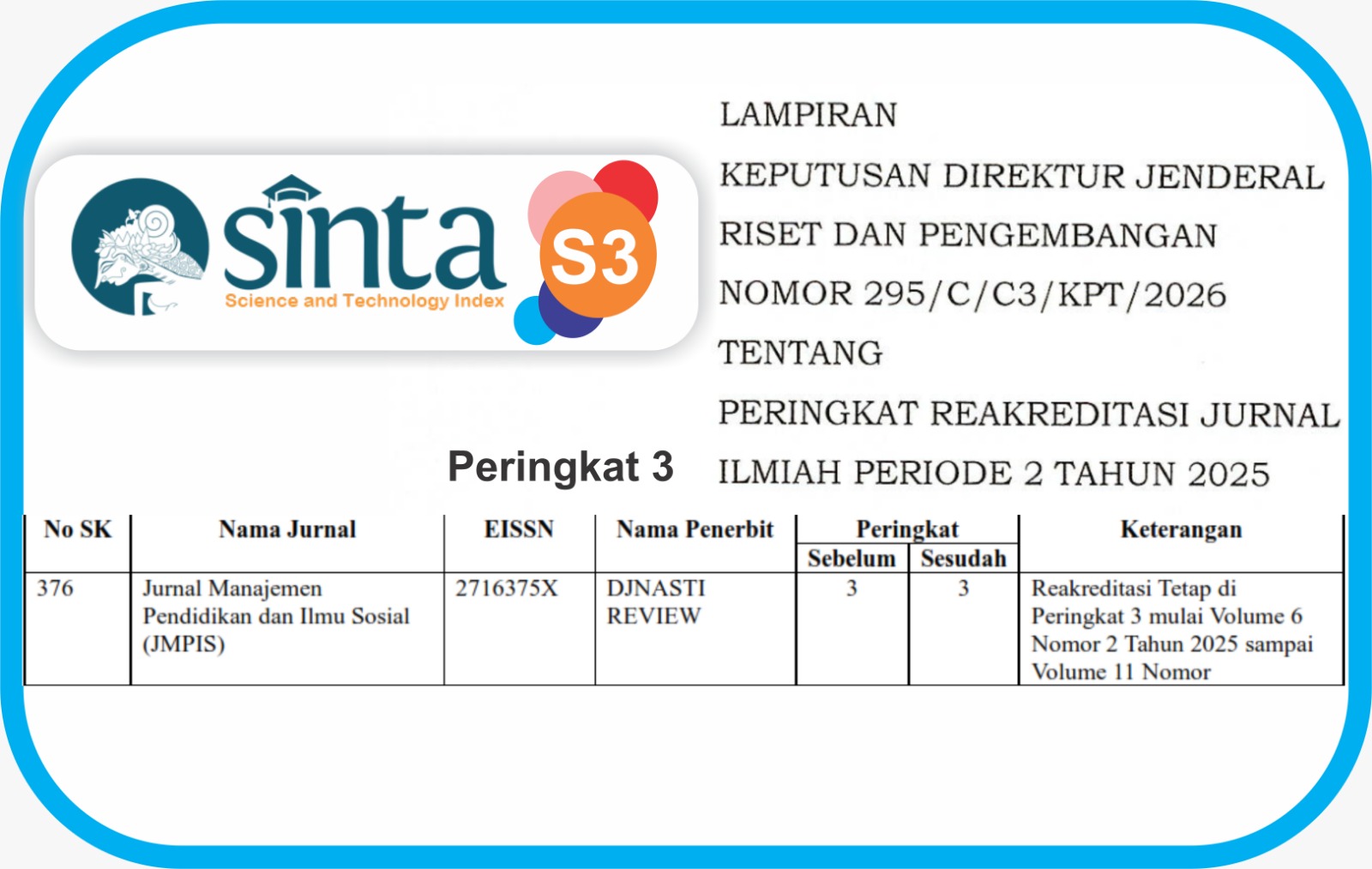The Mediation Effect of Self Confidence In The Effect of Self Efficacy on The Creativity of Msme Actors In East Java
DOI:
https://doi.org/10.38035/jmpis.v4i1.1437Keywords:
Self Efficacy; Self Confidence; CreativityAbstract
The participation of micro, small, and medium-sized enterprises (MSMEs) is one of the elements that can either contribute to or detract from the rate of economic growth in Indonesia. This study incorporates responses from 194 small and medium-sized businesses located within the province as its sample. This study made use of the purposive random sample approach for its data collection, and primary data was the type of data that was analyzed over the course of the study. Structural Equation Modeling (SEM), along with a Partial Least Squares (PLS) approach, is the technique for doing data analysis. According to the findings, a person's level of self-efficacy and self-confidence had a constructive and important bearing on their creative output. Furthermore, the findings indicate that self-confidence is able to operate as a mediator between the influence of self-efficacy and the creative output of MSME actors in East Java.
References
Alarjani, F. N., Anwar, B., Aslam, H. D., Iqbal, S., & Ayub, A. (2020). A moderated mediation model of entrepreneurial self-efficacy, institutional environment, and entrepreneurial orientation for SME development. SAGE Open, 10(3), 1-18.
Bandura, A., Adams, N. E., Hardy, A. B., & Howells, G. N. (1980). Tests of the generality of self-efficacy theory. Cognitive Therapy and Research, 39-66.
Bandura, Albert. (1977). Self-efficacy: Toward a unifying theory of behavioral change. Psychological Review 84: 191.
Chin, W. W. (1998). The Partial Least Squares Aproach to Structural Equation Modeling. Modern Methods for Business Research, 295, 336
Cohen, J. (1988). Statistical power analysis for the behavioral sciences. Hillsdale, NJ: Erlbaum.
Eliyana, Anis, Ahmad Rizki Sridadi Musta'in, and Novia Aviantari. (2020). Linking self efficacy on motivation and entrepreneurial achievements. Systematic Reviews in Pharmacy 11: 328-34.
Eniola, A. A. (2020). Entrepreneurial self-efficacy and orientation for SME development. Small Enterprise Research, 1-21.
Garaika, Hassan, and Helisia Margahana. (2019). Self efficacy, self personality and self confidence on entrepreneurial intention: Study on young enterprises. Journal of Entrepreneurship Education 22: 1-12.
Gelmar García-Vidal, Alexander Sánchez-Rodríguez, Reyner Pérez-Campdesuñer, Rodobaldo Martínez-Vivar. (2019). The impact of self-confidence, creativity and vision on leadership performance: perceptions at ecuadorian smes owner/managers. Serbian Journal of Management 14 (2) (2019) XX - XX
Junusi, R. E. (2021). The role of akhlak intelligence: Mediation between self-efficacy and entrepreneurial orientation. Journal of Digital Marketing and Halal Industry, 1-18.
Khalil, Muhammad, Mukaram Ali Khan, Syeb Sohaib Zubair, Hina Saleem, and Syed Nadeem Tahir. (2021). Entrepreneurial self-efficacy and small business performance in Pakistan. Management Science Letters 11: 1715-24.
Lamanepa, Amelia Wulandari, and Helena Sidharta. (2019). The effect of entrepreneurship education and self-efficacy of entrepreneurial intention. Review of Management and Entrepreneurship 3: 35-45
Mohd, R., Kirana, K., Kamaruddin, B. H., Zainuddin, A., & Ghazali, M. C. (2014). The mediatory effect of self-efficacy on the relationship between religious values and entrepreneurial orientations: A case of malay owner managers of SMEs in manufacturing industry. Procedia - Social and Behavioral Sciences, 130, 96-104.
Ngek, Neneh Brownhilder. (2015). Entrepreneurial self-efficacy and small business performance: The mediating effect of entrepreneurial mindset and openness to experience. Problems and Perspectives in Management 13: 271-80.
Norena-Chavez, Diego, and Ruben Guevara. (2020). Entrepreneurial Passion and Self-Efficacy as Factors Explaining Innovative Behavior: A Mediation Model. International Journal of Economics and Business Administration VIII: 352-73.
Oyeku, Oyedele M., Oduyoye Oluyesi, and Gloria N. (2020). Effect of entrepreneurial orientation, entrepreneurial self-efficacy, and environmental uncertainty on entrepreneurial success. International Journal of Small Business and Entrepreneurship Research 8: 34-67.
Pihie, Zaidatol Akmaliah Lope, and Afsaneh Bagheri. (2013). Self-Efficacy and Entrepreneurial Intention: The Mediation Effect of Self-Regulatio. Vocations and Learning 6: 385-401
Ratnasari, Siwi Dyah, & Salim, Andriansyah, Agus. (2014). Effect of Self Confident and Self Assessment for Performance with Social Skill as Moderating Variables
Sherer, M., Maddux, J. E., Mercandante, B., Prentice-Dunn, S., Jacobs, B., & Rogers, R. W. (1982). The self-efficacy scale: construction and validation. Psychological Reports, 51(2), 663-671.
Sriasih, A. A., Kusumawijaya, I. K., Adi, I. K., & Wartana, I. M. (2018). Entrepreneurial self-efficacy mediation in entrepreneurial competency prediction to entrepreneurial orientation. International Journal of Multdisciplinary Educational Research, 7, 8(2), 203-226.
Supriadi, I. (2022). Riset Akuntansi Keperilakuan?: Penggunaan SmartPLS dan SPSS Include Macro Andrew F. Hayes. Jakad Media Publishing.
Yusuff, Yusrinadini Z., Mahirah Maliani Mohamad, and Nur Yuhainis Ab Wahab. (2019). The Influence of General Self-Efficacy on Women Entrepreneurs. Academy of Entrepreneurship Journal 25: 1-6.
Zaini, Nadzly Zagwan Mohamed, Jati Kasuma Ali, Yusman Yacob, and abduk Ismail Mohd Jawi. (2016). Do Self Efficacy and Familiy Factor Matter? Understanding Women's Entrepreneurial Intention in SMEs in Sarawak. Paper presented at the International Conference on Business and Economics, September 21-23; pp. 1-9.
Downloads
Published
How to Cite
Issue
Section
License
Hak cipta :
Penulis yang mempublikasikan manuskripnya di jurnal ini menyetujui ketentuan berikut:
- Hak cipta pada setiap artikel adalah milik penulis.
- Penulis mengakui bahwa Jurnal Manajemen Pendidikan dan Ilmu Sosial (JMPIS) berhak menjadi yang pertama menerbitkan dengan lisensi Creative Commons Attribution 4.0 International (Attribution 4.0 International CC BY 4.0) .
- Penulis dapat mengirimkan artikel secara terpisah, mengatur distribusi non-eksklusif manuskrip yang telah diterbitkan dalam jurnal ini ke versi lain (misalnya, dikirim ke repositori institusi penulis, publikasi ke dalam buku, dll.), dengan mengakui bahwa manuskrip telah diterbitkan pertama kali di Jurnal Manajemen Pendidikan dan Ilmu Sosial (JMPIS).











































































